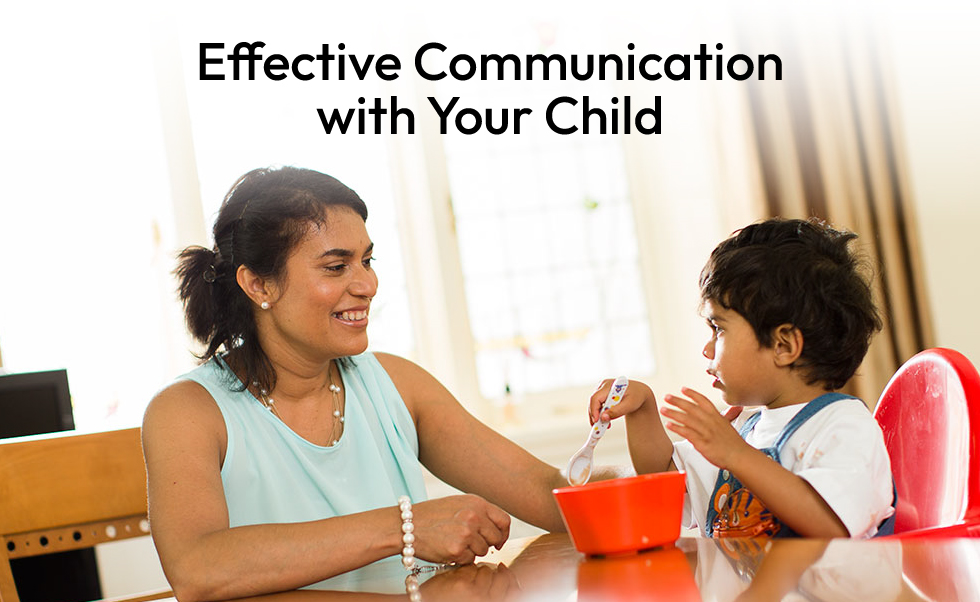Effective communication is one of the cornerstones of a healthy parent-child relationship. It fosters trust, understanding, and emotional closeness, laying a strong foundation for your child’s emotional and social development. As a mother, knowing how to communicate effectively with your child can make a significant difference in their upbringing. Here are some valuable tips for current and upcoming mothers to enhance their communication skills with their children.
Tips for effective communication with your child
1. Active Listening
Active listening is more than just hearing your child’s words; it involves fully engaging with their words. This means giving your child your undivided attention, maintaining eye contact, and showing interest in their thoughts and feelings.
- Tips for Active Listening:
- Make eye contact and nod to show you are paying attention.
- Avoid interrupting or finishing their sentences.
- Reflect on their words to show understanding, e.g., “It sounds like you felt sad when…”.
2. Create a Safe and Open Environment
Children need to feel safe and understood to express themselves freely. It is crucial to create an open environment where they feel comfortable sharing their thoughts and feelings.
- Creating a Safe Space:
- Encourage open dialogue and assure them that their opinions are valued.
- Avoid judgment or criticism; focus on understanding their perspective.
- Be patient and give them time to articulate their thoughts.
3. Use Simple and Clear Language
Children, especially younger ones, may not understand complex language. Using simple, clear, and age-appropriate language helps ensure your child understands your words.
- Communicating Clearly:
- Use short, simple sentences.
- Avoid using jargon or complicated words.
- Be direct and to the point, e.g., “Please put your toys away” instead of “It would be nice if the toys were not on the floor.”
4. Encourage Expressive Communication
Encouraging your child to express themselves is essential for their emotional development. Let them know it’s okay to talk about their feelings, whether happy, sad, scared, or angry.
- Fostering Expression:
- Ask open-ended questions to encourage detailed responses, e.g., “How did that make you feel?”.
- Validate their emotions by acknowledging their feelings, e.g., “I understand that you are upset.”
- Provide words for feelings they may not yet know, e.g., “It sounds like you are feeling frustrated.”
5. Be a Role Model
Children learn by observing their parents. Demonstrating effective communication skills teaches your child how to communicate respectfully and effectively.
- Modeling Good Communication:
- Show respect in your conversations, even when you disagree.
- Use polite language and manners.
- Express your feelings and thoughts openly and honestly.
6. Set Aside Quality Time

Spending quality time with your child helps strengthen your bond and improve communication. Dedicate time each day to engage in activities your child enjoys, and use this time to talk and connect.
- Quality Time Tips:
- Engage in activities encouraging interaction, such as reading together, playing games, or walking.
- Use mealtime as an opportunity for conversation.
- Limit distractions such as phones or television during this time.
7. Address Behavior, Not Character
When discussing your child’s behavior, it’s important to focus on the actions rather than labeling the child. This helps them understand that while certain behaviors may be unacceptable, they don’t reflect their worth.
- Positive Discipline:
- Use “I” statements to express your feelings about their behavior, e.g., “I feel worried when you don’t do your homework.”
- Discuss the behavior and its consequences, rather than making general statements about their character, e.g., “It’s important to finish your homework because it helps you learn,” instead of “You’re being lazy.”
8. Be Patient and Understanding
Patience is key to effective communication. Children may not always be able to articulate their thoughts and feelings clearly, and giving them time and space is important.
- Practicing Patience:
- Take deep breaths and remain calm, especially during challenging conversations.
- Allow your child to take their time to express themselves.
- Show empathy and understanding, even when it’s difficult.
9. Encourage Problem-Solving
Helping your child develop problem-solving skills empowers them to handle conflicts and challenges independently. Guide them through the process rather than providing immediate solutions.
- Problem-Solving Tips:
- Ask questions that encourage them to think critically, such as “What do you think we should do about this?”
- Discuss possible solutions and their consequences.
- Praise their efforts and progress in finding solutions.
10. Consistency is Key
Consistent communication helps your child understand what to expect and builds trust. Ensure that your messages are consistent, and follow through with your commitments.
- Maintaining Consistency:
- Establish clear rules and expectations and stick to them.
- Be consistent in your responses and follow through on promises.
- Regularly check in with your child to reinforce messages and expectations.
Conclusion
Effective communication with your child fosters a strong, trusting relationship. By actively listening, creating a safe environment, using clear language, and encouraging expressive communication, you can enhance your bond and support your child’s emotional and social development. Remember, good communication is built on patience, understanding, and love. Implementing these tips can help your child grow into a confident and emotionally healthy individual.







